
Related
Guests
- May Boeveexecutive director of 350 Action, the political arm of the climate organization 350.org.
As Hurricane Matthew bears down on the Florida coast, onto Georgia and South Carolina, we discuss how the role of climate change has been largely ignored in media coverage of the storm. “If the TV networks don’t start making these links between climate change and extreme weather events, they will be one of the last bastions of climate denial,” says May Boeve, executive director of 350 Action, the political arm of the climate organization 350.org.
Transcript
JUAN GONZÁLEZ: Hurricane Matthew is now bearing down on the Florida coast. The tropical storm’s wind gusts of 107 miles per hour and torrential downpours have already knocked out power for 300,000 people in Florida. Meteorologists are warning of devastating storm surges. One wave 17 feet high has already been spotted off the coast near Cape Canaveral. President Obama has declared a state of emergency for Florida, Georgia and South Carolina. Florida Governor Rick Scott has activated the 3,500 members of the state’s National Guard. Scott also urged residents living in mandatory evacuation zones to flee, warning, quote, “This storm will kill you,” unquote.
AMY GOODMAN: More than 3 million people in Florida, Georgia and South Carolina are under evacuation orders.
To discuss how the role of climate change has been largely ignored in media coverage of Hurricane Matthew, we’re joined now in our New York studio by May Boeve, executive director of 350 Action, the political arm of the climate organization 350.org.
May, it’s great to have you with us. We so often see the words “extreme weather” and “severe weather” flashing in the lower thirds of the TV screens. Where are the words “climate change” and “global warming”?
MAY BOEVE: You’re exactly right. And Hurricane Matthew is, unfortunately, just the latest example of a trend where the impacts of climate change get more serious, politicians continue to have a break and say not nearly enough about it.
We have unequivocal reason to know that these kinds of storms are made worse by climate change. Particularly when we look at the amount of storm surge, Hurricane Matthew is coming into these coast on seas that are almost a foot higher because of sea level rise linked to climate change. Climate change brings more rainfall and threatens further flooding. So, without a doubt, we know we can make these connections. The science is clear.
And we’re seeing a deafening climate silence from journalists and in this presidential cycle, where there have been no questions asked in the debates about this issue. And even today, we saw an op-ed from Paul Krugman suggesting that if this weekend in the debates there is not a question about climate change, he said it is almost criminally irresponsible.
JUAN GONZÁLEZ: Well, in the vice-presidential debates, there were no questions, but Mike Pence—I don’t know how many times he kept talking about the war on coal that he believed Hillary Clinton was involved in, and yet even then the journalist didn’t take it up.
MAY BOEVE: Well, that’s exactly right. And we know who is responsible for this problem. That’s why the climate silence is such a serious issue and something we have to confront, because it’s not like we don’t know why this is happening and we don’t have a solution. In fact, the opposite is true. We know that the fossil fuel industry benefits when climate change is not discussed, because these storms scare people. They alarm the public, and people want to see leadership. And when there’s no discussion of the issue, it leaves the fossil fuel industry players, like Exxon, without any real focus on their activities. We know what needs to happen to reduce the threat of climate change, and it’s leaving fossil fuels in the ground. And so, these moments are times when we need to talk about just how serious this problem is.
The devastation in Haiti is incredible, and it is a reminder to us, just as Edwidge said, that the poorest and most vulnerable are always affected first by these problems. And so the climate silence in that context is even more devastating.
AMY GOODMAN: I wanted to go to the first presidential debate between Donald Trump and Hillary Clinton Clinton. The moderator, Lester Holt, did not ask about climate change, but it came up once during the brief exchange.
HILLARY CLINTON: Take clean energy. Some country is going to be the clean energy superpower of the 21st century. Donald thinks that climate change is a hoax perpetrated by the Chinese. I think it’s real.
DONALD TRUMP: I did not. I did not.
HILLARY CLINTON: I think the science is real.
DONALD TRUMP: I do not say that.
HILLARY CLINTON: And I think it’s important—
DONALD TRUMP: I do not say that.
HILLARY CLINTON: —that we grip this and deal with it, both at home and abroad.
AMY GOODMAN: Last year, Donald Trump appeared on The Hugh Hewitt Show and was asked about global warming.
HUGH HEWITT: Do you believe that the temperature of the Earth is increasing? And what would you do, if you do believe that, vis-à-vis global climate change?
DONALD TRUMP: Well, first of all, I’m not a believer in global warming. I’m not a believer in man-made global warming. It could be warming, and it’s going to start to cool at some point. And, you know, in the early—in the 1920s, people talked about global cooling. I don’t know if you know that or not. They thought the Earth was cooling. Now it’s global warming. And actually, we’ve had times where the weather wasn’t working out, so they changed it to “extreme weather,” and they have all different names, you know, so that it fits the bill.
AMY GOODMAN: And in December, Donald Trump was asked a similar question by Bill O’Reilly on Fox.
BILL O’REILLY: Do you believe in global warming, climate change? Do you think the world’s going to change for the worse because it’s getting warmer?
DONALD TRUMP: I think that there’ll be little change here. It’ll go up, it’ll get a little cooler, it’ll get a little warmer, like it always has for millions of years. It’ll get cooler, it’ll get warmer. It’s called weather. I do believe in clean—and I’ve received—a lot of people don’t know this: I’ve received many environmental awards, many, many environmental awards, for the work I do. And I believe strongly in clean water and clean air. But I don’t believe that what they say—I think it’s a big scam for a lot of people to make a lot of money.
AMY GOODMAN: And in 2012, Donald Trump tweeted: “The concept of global warming was created by and for the Chinese in order to make U.S. manufacturing non-competitive,” he said. Well, yesterday, we reported on Greenpeace revealing Donald Trump has multiple financial ties to the $3.8 billion Dakota Access pipeline, which has faced months of resistance from the Standing Rock Sioux Tribe in North Dakota, as well as members of hundreds of tribes across the U.S., Canada and Latin America. One of Trump’s financial disclosure forms shows he has between $500,000 and a million dollars invested in Energy Transfer Partners, the main company behind the Dakota Access pipeline. Trump also has $50,000 to $100,000 invested in Phillips 66, which is slated to own 25 percent of the pipeline, if it’s completed. What about Donald Trump’s climate denialism? We’ll see what happens on Sunday, if he even has to raise it, if he’s even asked.
MAY BOEVE: Well, we might consider calling Hurricane Matthew “Hurricane Donald.” There’s a start, actually linking that climate denial helps lead to inaction, and therefore more problems. But debate moderators have not asked Donald Trump during the primary a single question about climate, so he has been left relatively off the hook on this issue, so we have to hear from him. And if people listening want to get involved, you can Google open questions, open debates, and vote for a climate question. Right now it’s ranked sixth in the order. And I think this weekend we have to hear. If the TV networks don’t start making these links between climate change and extreme weather events, they will be one of the last bastions of climate denial. And that has to change.
JUAN GONZÁLEZ: I want to ask you—Trump has vowed to undo the Paris climate accords if he becomes president. Can he? Or what could he do to sabotage the accord, if he did becomes president?
MAY BOEVE: Well, as we know, it only entered into effect a few days ago. So, there’s a lot of concern about what would happen if he were elected president, given what he has said. I think we have some mechanisms to stop that, but the most important thing is we have to stop that outcome from happening. Donald Trump in the White House is a disaster for the climate. It cannot be overstated.
AMY GOODMAN: Well, let’s talk about Hillary Clinton for a moment, in her own words, on fracking, from March, during a debate with Bernie Sanders.
HILLARY CLINTON: You know, I don’t support it when any locality or any state is against it, number one. I don’t support it when the release of methane or contamination of water is present. I don’t support it, number three, unless we can require that anybody who fracks has to tell us exactly what chemicals they are using. So by the time we get through all of my conditions, I do not think there will be many places in America where fracking will continue to take place. And I think that’s the best approach, because right now there are places where fracking is going on that are not sufficiently regulated. So, first, we’ve got to regulate everything that is currently underway, and we have to have a system in place that prevents further fracking unless conditions like the ones that I just mentioned are met.
ANDERSON COOPER: Senator Sanders, you—
SEN. BERNIE SANDERS: My answer—my answer is a lot shorter: No, I do not support fracking.
AMY GOODMAN: That was a town hall with Bernie Sanders and Hillary Clinton that was moderated by Anderson Cooper, who will be the moderator of the town hall in St. Louis on Sunday. And by the way, Democracy Now! will be broadcasting the whole town hall debate between Donald Trump and Hillary Clinton, but we will expand the debate. After each question is put to Hillary Clinton and Donald Trump, we will put the same question to Green Party presidential candidate Jill Stein, breaking the sound barrier. We’ll also have a roundtable discussion. That is 8:00 Eastern [Daylight] Time to 11:30 on Sunday night. But let me ask you that question about fracking and Hillary Clinton.
MAY BOEVE: We know that to prevent the worst effects of climate change, there can be no fracking. In fact, a new report that just came out from Oil Change International makes it abundantly clear: no more pipelines, no more mines, no more fracking. So, there is no question that we are going to push whoever is elected on this issue.
AMY GOODMAN: And DAPL, the Dakota Access pipeline. In the midst of this debate, we see lockdown after lockdown. Now, the sheriff of North Dakota, in the area where the encampments are of thousands of people, is calling in law enforcement, possibly from other states.
MAY BOEVE: This is a fight of historic proportion. And I want to thank you, in particular, for highlighting it. I think what we’re seeing on the ground in the Dakotas is a sign that the movement to keep fossil fuels in the ground is stronger all the time. Moreover, the story of the historic unity among these tribes has inspired people all around the world. We’re going to continue to support their fight as much as we can, and we hope everyone listening will do everything they can, as well.
JUAN GONZÁLEZ: And one quick question about fracking. There’s big—there are obviously big battles here in the United States, but what’s happening abroad in terms of fracking, which is—
MAY BOEVE: Too much. They’re starting to frack in the Amazon. But the good news is 180 municipalities have banned fracking in Brazil. There’s fracking throughout Europe, and there’s fracking in North Africa. And for the next climate conference of the U.N., happening in Morocco later this month, fracking will be a major issue we’ll be profiling there, as well. So, there’s a lot of investment in fracking. Of course, you can see Exxon’s footprints all over that. But equally impressive are the groups that are standing up to fight fracking, just like they have in New York, where a moratorium was declared.
AMY GOODMAN: And Democracy Now! will be in Marrakech for the U.N. climate summit. It starts the week of the election and then goes for another week. May Boeve, thanks so much for being with us, executive director of 350 Action, the political arm of the climate organization 350.org.
When we come back from break, a cold case is solved, a serial killer of women. The solution started with a tip from a woman who was listening to Democracy Now! when she made a call to a Mississippi reporter. Stay with us.

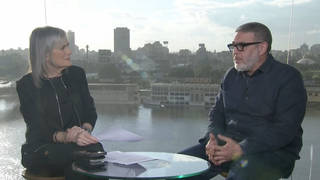
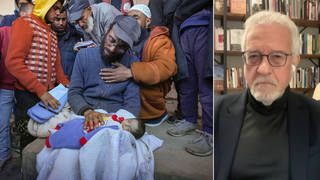
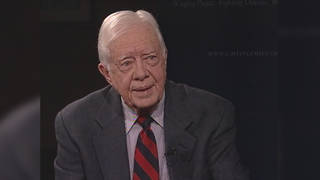
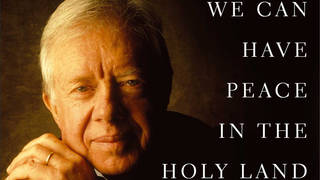





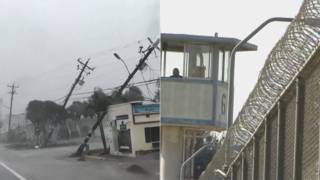
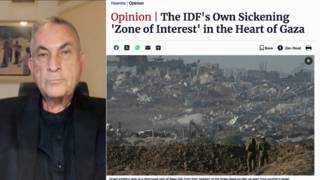
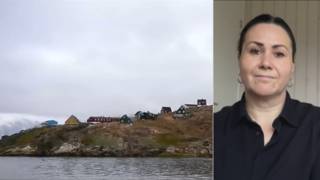
Media Options